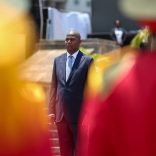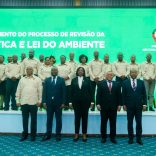President Chapo calls for new phase of reciprocal cooperation between Mozambique and Portugal
Mozambique: Lawyers oppose detention without charge amendment – AIM report

Photo: Miramar
The Mozambican Bar Association (OAM) on Tuesday urged President Filipe Nyusi not to promulgate amendments to the Penal Procedural Code, which greatly extend the period during which suspects can be detained without trial.
The Mozambican parliament, the Assembly of the Republic, unanimously approved the amendments on Monday.
Previously, suspects could be held for a maximum of four months without charge. The amendments say that this will remain the case for most suspects, but for serious crimes such as “terrorism, violent crime or highly organised crime, or when the crime can be punished by a sentence longer than eight years imprisonment”, the period of detention without charge can be extended to six months.
Under the current law, if a person is charged, but no court has taken a decision on whether to hold a trial, the suspect must be released after four months. The amendments raise this period of detention without trial to a maximum of ten months.
Even longer periods of preventive detention, of 12 or 16 months, the amended code says, can apply to crimes “of exceptional complexity, regarding the quality of the injured parties or the highly organised nature of the crime”.
At a Maputo press conference on Tuesday, the OAM chairperson, Duarte Casimiro, denounced the secrecy with which the matter had been handled, and warned that lengthening the period of detention without charge was “an assault against the democratic rule of law”.
He said there may have been good intentions behind the alterations to the Penal Procedural Code, but there was a lack of “participatory spirit” in discussing the proposals.
Not enough time had been given for debating potentially far-reaching changes. “This is a matter which greatly concerns us”, said Casimiro, “because, just as has happened in the past, there should have been a participatory movement in which everybody could take part”.
The amendments to the Code affect the rights and freedoms of citizens specified in the Mozambican Constitution, added Casimiro, and so he believed that Nyusi should not promulgate them.
Instead, the amendments should be referred to the Constitutional Council, Mozambique’s highest body in matters of constitutional law, for a ruling as to whether or not they violate the Constitution.











Leave a Reply
Be the First to Comment!
You must be logged in to post a comment.
You must be logged in to post a comment.